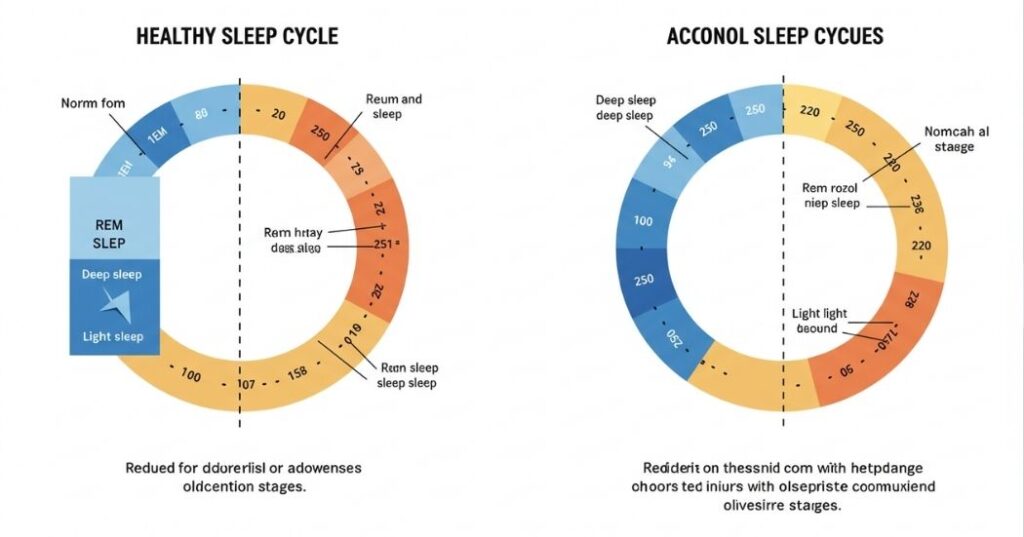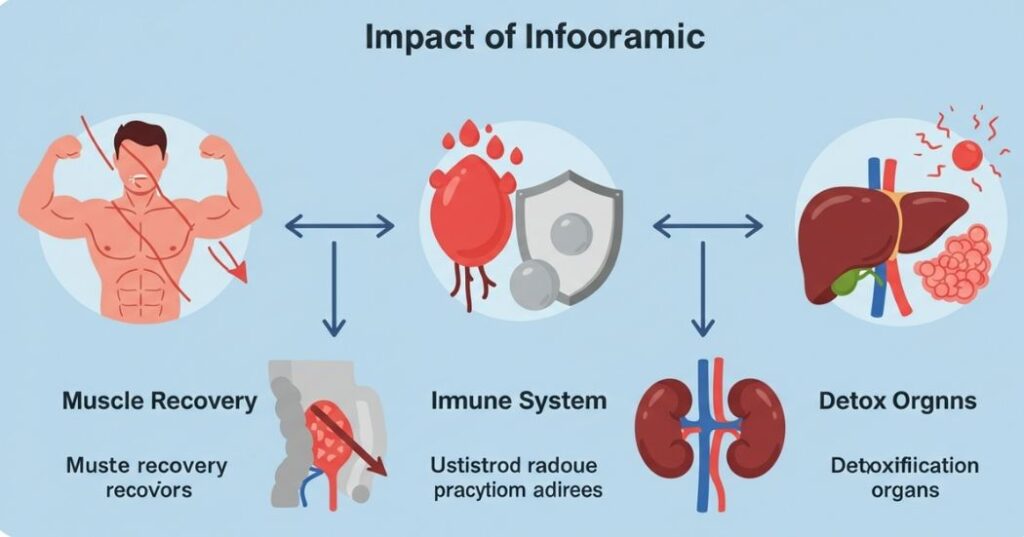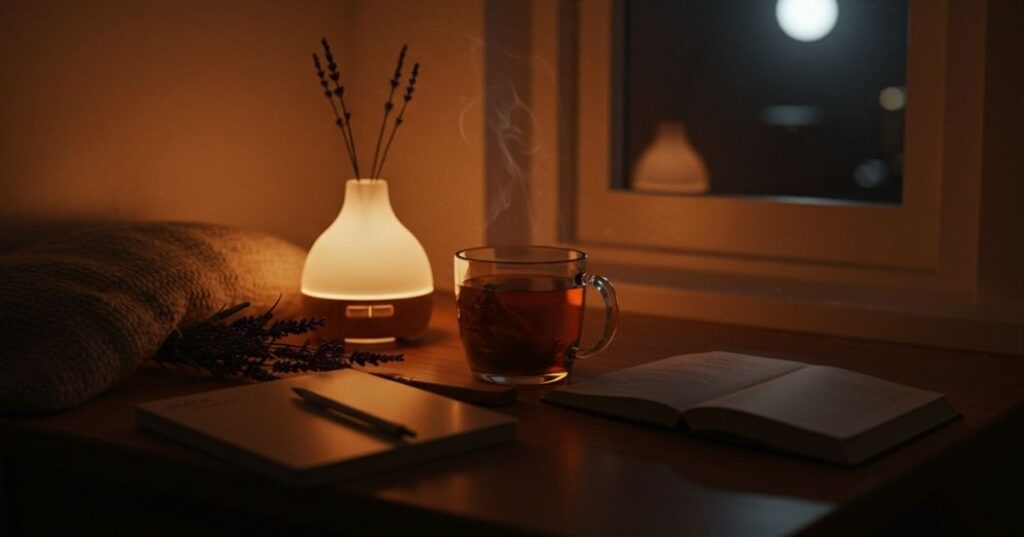The Truth About Nightcaps: Effects of Alcohol on Sleep Quality and Recovery
Curious how alcohol and sleep quality are really connected? Grabbing a glass of wine to unwind before bed is common—but science reveals that alcohol and sleep quality don’t mix as well as you might think. This post explores the real connection between alcohol and sleep quality—how it feels like it helps, but ultimately hinders. Nightcaps may help you fall asleep faster, but they often sabotage the restorative rest your body truly needs.
Here’s how alcohol really affects your body’s ability to rest, recover, and rejuvenate overnight.
🧠 How Alcohol Disrupts Sleep Architecture (And Why Sleep Quality Suffers)

Understanding the impact of alcohol on sleep quality means looking at what it does to your brain’s natural sleep architecture.
While alcohol is a central nervous system depressant, it doesn’t create healthy sleep—it mimics sedation, not restoration. The initial drowsiness alcohol induces can be deceptive. It might make you feel like you’re falling asleep faster, but the quality of that sleep is significantly compromised. This impact is primarily on your sleep architecture, the intricate pattern of sleep stages your brain cycles through each night.
The Stages of Sleep and Alcohol’s Disruption:
Normal, restorative sleep consists of distinct stages:
- Non-Rapid Eye Movement (NREM) Sleep: This includes light sleep (Stages 1 and 2) and deep sleep (Stages 3 and 4, also known as slow-wave sleep). Deep sleep is physically restorative, crucial for tissue repair, muscle growth, and strengthening the immune system.
- Rapid Eye Movement (REM) Sleep: This is the stage associated with vivid dreaming, emotional regulation, and memory consolidation. It’s when your brain processes information and solidifies learning from the day.
Alcohol dramatically alters this natural progression:
- Suppresses REM Sleep: Alcohol significantly reduces the amount of time you spend in REM sleep, particularly in the first half of the night. This suppression can have serious consequences for your cognitive function, emotional well-being, and ability to learn and remember. Without adequate REM sleep, you might find yourself struggling with concentration, mood swings, and difficulty recalling information.
- Delays Deep Sleep: While alcohol might initially push you into light sleep faster, it actually delays the onset of deep sleep. The time you spend in this crucial restorative phase is reduced. This means your body misses out on vital repair processes, including the release of growth hormone, which is essential for cellular regeneration and physical recovery.
- Fragmented Sleep in the Second Half: The most disruptive effect of alcohol on sleep often occurs as your body metabolizes the alcohol. As blood alcohol levels begin to drop in the latter half of the night, alcohol starts to act as a stimulant. This rebound effect causes numerous micro-awakenings (brief awakenings you might not even remember) and pulls you out of deeper sleep stages into lighter, more disturbed sleep. This fragmentation means your sleep cycles are constantly interrupted, preventing you from achieving truly restorative rest.
A study in the journal “Alcohol” specifically highlights that as alcohol is metabolized, sleep becomes progressively lighter and more disturbed in the second half of the night, leading to a less refreshing and more fragmented sleep experience.
📉 How This Affects Overnight Recovery

Sleep isn’t just about resting your eyes; it’s a dynamic period of intense physiological activity where your body undertakes essential repair, detoxification, and recharging processes. One of the least understood effects of alcohol and sleep quality disruption is how it compromises hormonal repair and physical recovery. Alcohol interferes with nearly every aspect of this critical overnight recovery.
- Muscle Repair Halts: The deep sleep stage is when the majority of growth hormone is released. This hormone is vital for muscle repair, tissue regeneration, and fat metabolism. By suppressing deep sleep, alcohol drastically reduces growth hormone secretion, effectively slowing or even halting your body’s ability to recover from physical exertion. This can be particularly detrimental for athletes or anyone engaged in regular physical activity, leading to prolonged soreness and impaired performance.
- Immune Response Drops: Sleep is a powerful modulator of your immune system. During sleep, your body produces cytokines, proteins that help fight infection and inflammation. Poor or fragmented sleep, often induced by alcohol, weakens your immune response, making you more susceptible to illnesses like colds and flu. It can also prolong recovery from existing infections and increase systemic inflammation throughout the body.
- Hormonal Imbalance: Beyond growth hormone, alcohol can disrupt other crucial hormonal balances. It can affect the production of melatonin, the sleep-regulating hormone, and cortisol, the stress hormone. An imbalance in these hormones can lead to persistent fatigue, increased anxiety, and difficulty regulating mood.
- Detoxification Impairment: Your liver works overtime to metabolize alcohol, diverting resources away from other essential detoxification processes that typically occur during sleep. This can place an additional burden on your organs and potentially hinder the removal of other toxins from your system.
- Mood and Energy Suffer: Even if you spend eight hours in bed after drinking, the poor sleep architecture means you’re not getting truly restorative rest. This leads to residual fatigue, decreased alertness, and impaired cognitive function the next day. You might feel irritable, unfocused, and generally unwell, commonly known as a “sleep hangover,” even without the typical symptoms of an alcohol hangover. This constant state of low energy can significantly impact your daily productivity and overall quality of life.
According to the Sleep Foundation, even small doses of alcohol can disrupt the body’s natural circadian rhythms, leading to increased fatigue the following day and making it harder to establish a consistent sleep-wake cycle.
🍷 The Nightcap Myth—Why It Feels Like It Helps
The allure of the nightcap lies in its immediate sedative effect. Alcohol is a central nervous system depressant, which means it slows down brain activity. This can indeed make you feel drowsy and relaxed, facilitating what seems like a quicker transition to sleep. But this initial ease is deeply misleading.
- Temporary Sedation: The drowsiness alcohol induces is a short-lived phenomenon. As your body metabolizes the alcohol, the sedative effect wears off surprisingly quickly, often within a few hours. This is precisely when the stimulant effects kick in, leading to the fragmented sleep discussed earlier. You fall asleep easily, but the quality of that sleep deteriorates rapidly.
- Superficial and Disjointed Sleep: This is where the illusion of alcohol and sleep quality being linked in a helpful way truly unravels. The sleep you achieve after drinking is not the deep, restorative kind your body needs. It’s often characterized by lighter stages of sleep, frequent awakenings (even if you don’t fully remember them), and a significant reduction in REM sleep. This is why you can “sleep” for many hours after a nightcap and still wake up feeling utterly unrefreshed and tired.
- Masking Underlying Issues: For many, the nightcap serves as a coping mechanism for stress, anxiety, or an overstimulated mind that struggles to shut down naturally. Alcohol provides a false sense of calm, masking these underlying issues rather than addressing them. This can lead to a dangerous cycle where reliance on alcohol as a sleep aid becomes entrenched, making it harder to fall asleep naturally without it. Over time, this can exacerbate existing sleep problems and even lead to the development of chronic insomnia.
Long-term use of alcohol as a sleep aid is strongly linked to the development and exacerbation of insomnia and other chronic sleep disorders, creating a dependence that undermines true sleep health.
✨ What to Try Instead: Sleep-Smart Alternatives

Breaking the nightcap habit requires replacing it with healthier, truly restorative rituals. The goal is to build a consistent bedtime routine that signals to your body it’s time to wind down naturally.
🌿 Herbal Bedtime Teas:
Many herbs have natural calming properties that can promote relaxation without the detrimental effects of alcohol.
- Chamomile: Widely known for its mild sedative effects, chamomile tea can help reduce anxiety and promote drowsiness.
- Lemon Balm: This herb is traditionally used to calm the nervous system, reduce stress, and improve sleep.
- Valerian Root: A more potent herbal sedative, valerian root has been studied for its potential to reduce sleep latency (the time it takes to fall asleep) and improve sleep quality for some individuals. It’s important to note its distinct earthy aroma.
- Passionflower: Another herb known for its calming properties, it can help alleviate anxiety and promote relaxation before bed.
- Lavender: The aroma of lavender is renowned for its relaxing effects. Sipping on lavender tea or using a lavender essential oil diffuser can aid in winding down.
💡 Light-Based Wind-Down:
Our bodies are highly attuned to light. Mimicking the natural progression from daylight to darkness can significantly improve melatonin production and sleep onset.
- Dim lights 60-90 minutes before bed: Start lowering the ambient light in your home as evening approaches. Use warmer, softer light bulbs.
- Avoid screens or use blue-light filters: The blue light emitted from smartphones, tablets, computers, and TVs can suppress melatonin production, making it harder to fall asleep. Aim to switch off all screens at least an hour before bed. If unavoidable, use blue-light filtering glasses or the night mode settings on your devices.
🧘♀️ Mindfulness for Sleep:
Calming your mind is crucial for sleep. Practices that shift your focus away from daily stressors can be incredibly effective.
- Try 5-minute breathing apps: Apps like Insight Timer, Headspace, Calm, or even simple guided breathing exercises can help slow your heart rate, quiet your mind, and prepare your body for sleep. Focus on slow, deep breaths, inhaling deeply through your nose and exhaling slowly through your mouth.
- Progressive muscle relaxation: This technique involves tensing and then relaxing different muscle groups throughout your body, helping to release physical tension and promote a sense of calm.
- Gentle stretching or Yin Yoga: Light, restorative stretches can release physical tension without stimulating your body.
- Journaling: If your mind races with thoughts, spend 10-15 minutes before bed writing down your concerns or your day’s events. This can help clear your mind.
🍫 Nutrition Support for Sleep:
Certain nutrients and compounds found in foods can naturally support sleep.
- Magnesium-rich snacks: Magnesium is a mineral crucial for muscle relaxation and nervous system regulation. Incorporate snacks like bananas, a small square of dark chocolate (70% cacao or higher), pumpkin seeds, almonds, or a handful of spinach.
- Tart Cherry Juice: This natural juice is a good source of melatonin, the body’s sleep hormone, and tryptophan, an amino acid that helps produce serotonin and melatonin. A small glass of unsweetened tart cherry juice before bed can be beneficial.
- Tryptophan-rich foods: Tryptophan is a precursor to serotonin and melatonin. Foods like turkey, chicken, eggs, nuts, and seeds can contribute to better sleep.
- Avoid heavy meals close to bedtime: Give your digestive system a break. Aim to finish your last substantial meal at least 2-3 hours before you plan to sleep.
✅ Real Talk: Can You Drink and Still Sleep Well?
The ideal scenario for optimal sleep is to avoid alcohol altogether, especially in the hours leading up to bedtime. However, for many, complete abstinence isn’t always realistic. If you choose to drink, here’s how to minimize its negative impact on your sleep:
- Stop drinking at least 3 hours before bed: This allows your body sufficient time to metabolize most of the alcohol before you lie down, reducing the likelihood of the stimulant rebound effect and fragmented sleep. The longer the gap, the better your sleep quality will likely be.
- Limit intake to 1–2 standard servings: The more alcohol you consume, the more pronounced its negative effects on your sleep architecture will be. One to two standard drinks for men and one for women is generally considered a moderate intake. Avoid binge drinking entirely, as its impact on sleep is severe and prolonged.
- Rehydrate with water and electrolytes afterward: Alcohol is a diuretic, meaning it increases urine production and can lead to dehydration. Staying hydrated by drinking water between alcoholic beverages and before bed can help mitigate some of the negative physiological effects, though it won’t prevent sleep disruption.
- Skip sugary mixers that spike blood sugar + crash: Sugary drinks not only add unnecessary calories but also cause rapid spikes and crashes in blood sugar, which can further disrupt sleep. Opt for plain water or soda water as a mixer, or choose unsweetened spirits.
If you care about sleep quality, it’s time to rethink alcohol’s role in your nighttime routine. The link between alcohol and sleep quality is real—and it’s mostly negative.
📌 The Takeaway
Nightcaps don’t help sleep—they hijack it. When it comes to alcohol and sleep quality, the science is clear: true overnight recovery requires real rest, not sedation.
While alcohol may induce initial drowsiness, it disrupts your sleep architecture, reducing REM and deep sleep—critical phases for physical restoration, muscle repair, and hormonal balance. Over time, this compromises your immunity, energy, mood, and even metabolic health.
Instead of relying on alcohol, prioritize building a sleep-smart routine that supports your nervous system and promotes truly restorative rest. Sip a calming tea, dim your lights, do a short breathing practice, or explore nutrition-based strategies for recovery.
And if alcohol has been part of your wind-down habit, now’s the time to pivot—with simple tools that actually restore.
🔗 Related Reads
- → Retrain Your Brain for Sleep: CBT-I Techniques for Insomnia Recovery
- → The Perfect Wind-Down: Creating a Bedtime Routine for Sleep Recovery
- → Eat Your Way to Better Rest: Best Foods for Sleep Recovery
- → Hydration and Skin: How Drinking Water Supports Overnight Recovery
- → The Sleep-Gut Connection: How Night Habits Impact Digestive Health
✅ Ready to Sleep Smarter?
If you’re ready to trade restless nights for real rest, take one small step tonight—swap the wine for a wind-down ritual that works.
Explore our full sleep recovery series here and give your body the support it truly needs.
Your best rest is waiting. 🌙💤
📚 References
- Sleep Foundation. How Alcohol Affects Sleep
Explains how alcohol disrupts REM cycles and deep sleep, leading to fragmented rest and poor overnight recovery. - National Council on Aging (NCOA). What Alcohol Really Does to Your Sleep
Highlights short- and long-term effects of alcohol on sleep patterns and circadian rhythm. - National Institutes of Health (NIH) – PMC. Alcohol and Sleep: A Complex Relationship
Peer-reviewed review detailing alcohol’s pharmacological impact on different stages of sleep and its neurological effects. - ScienceDirect. Alcohol Disrupts Sleep Architecture
In-depth scientific analysis of how alcohol impairs normal sleep cycles and increases sleep fragmentation. - Harvard Medical School. Sleep and Alcohol: Tips for Better Rest
Practical advice and summaries of clinical research on minimizing alcohol’s negative impact on sleep quality.

